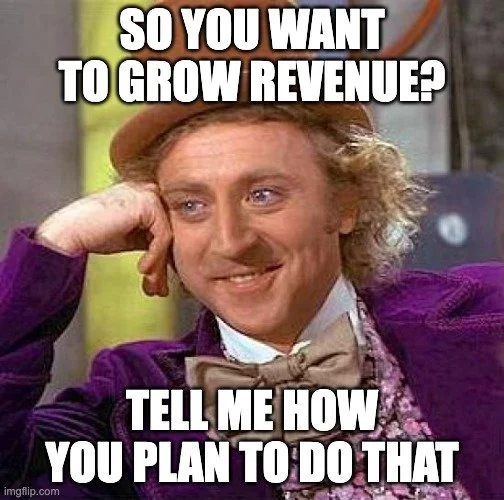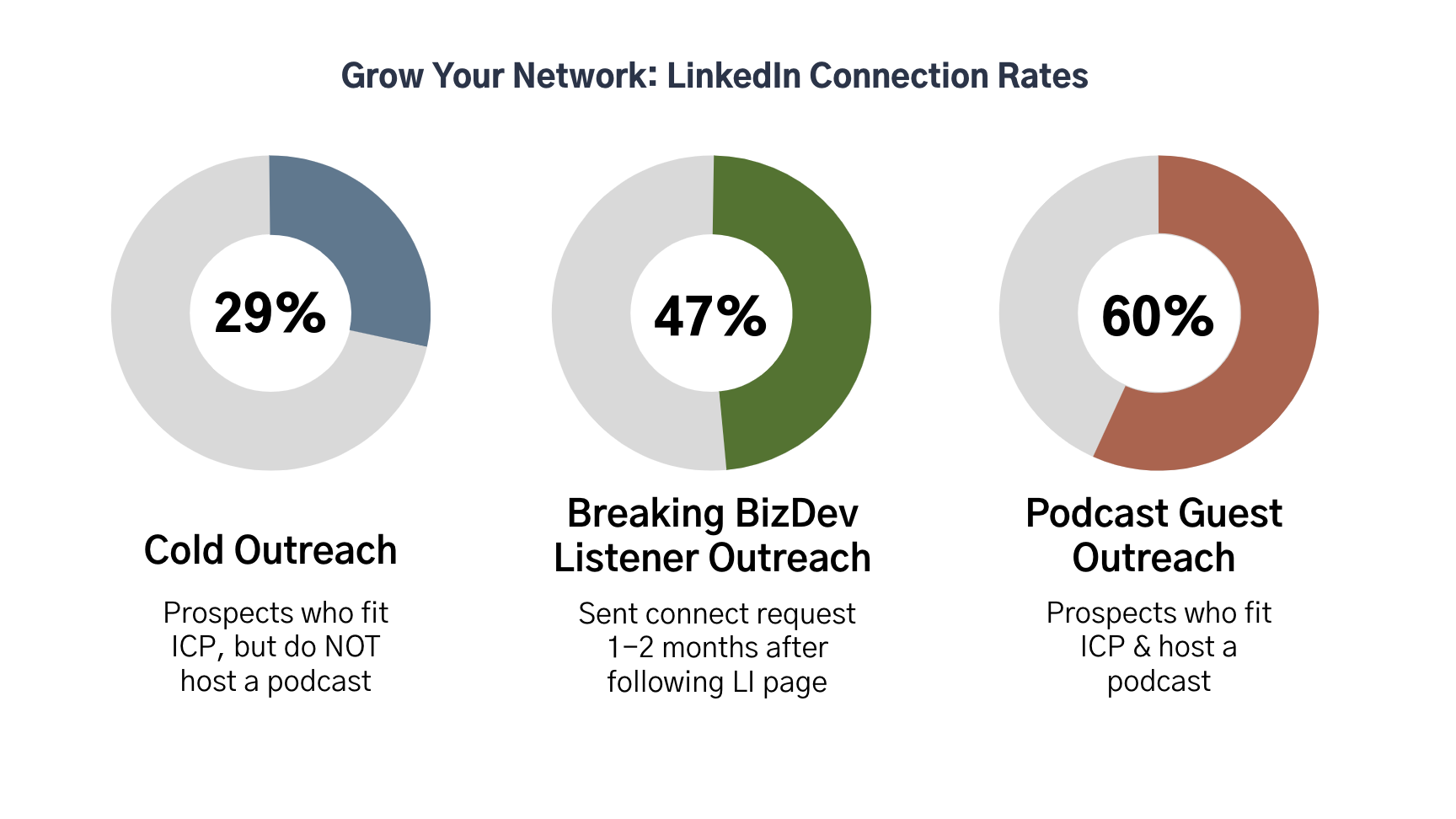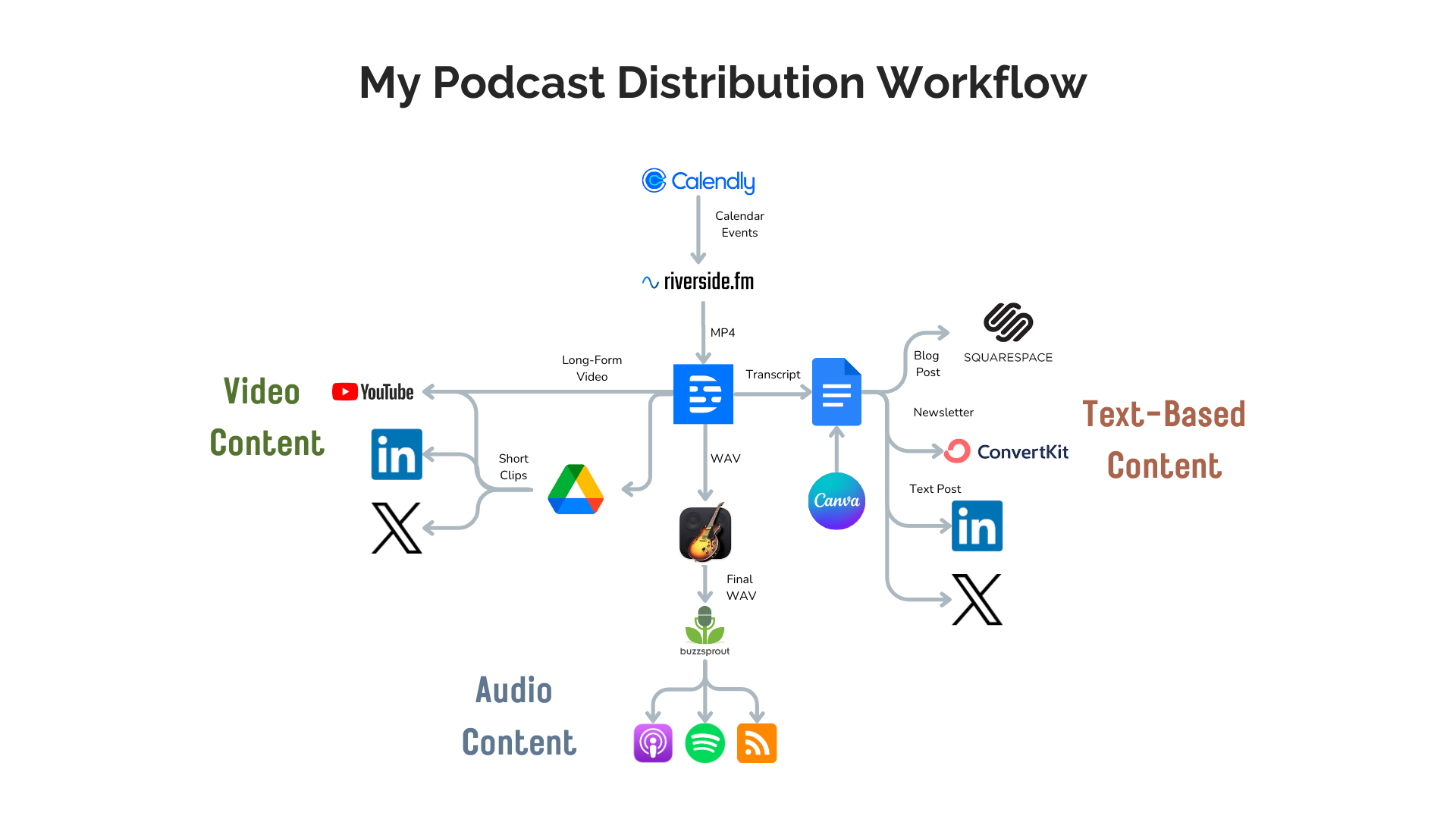Should You Start a Business Podcast? 5 Questions to Answer First
Podcasting seems like a crowded space, but it's really not. It’s a blue ocean opportunity. Especially for expertise-driven businesses who need to build trust with buyers, accelerate network growth, and create endless content. If you’re asking yourself, “should I start a podcast?” then you’re in the right place.
This article explores five critical questions that you need to answer before you launch a podcast for your business:
How would a podcast roll up to your business goals?
Why would your ideal clients listen?
How many podcasts are there in your niche?
Are you willing to commit to 12+ months?
What do you need to start a podcast?
Let’s dig into each one, shall we?
1. How would a podcast roll up to your business goals?
In my experience, many small businesses have a similar goal of growing revenue. But how? Revenue growth for a professional services firm can happen in a number of ways…
Ask yourself, how are you going to generate more revenue for your business?
Generating leads for services?
Commanding premium fees?
Improving your close rates?
Courses and community?
Attracting sponsors?
This is a critical step because it should have influence over how your podcast is positioned. For example, if your goal is lead generation then you might structure your show in a way that interviews your ideal clients.
In October 2023, I launched two podcasts in support of my business: Breaking BizDev and Podcasting in Professional Services. Both play different roles in my strategy, but these podcasts ultimately rolled up to three business goals:
Generate new business leads
Accelerate my professional network growth
Create a content engine and library
Here’s what I’ve learned so far:
Using a podcast to generate leads
At first, you might think the only way a podcast can generate leads is when listeners hear your call to action, then reach out directly. It doesn’t really work that way.
Instead, podcasting is about having conversations. Those conversations turn into introductions and referrals. The more conversations you have with the right people, the more inquiries into your services. I’ve seen this play out with my clients and in my own business. I’ve interviewed ideal clients who have made referrals that turned into clients.
For experts and professional services firms, a podcast can generate leads, but it will take time and commitment to nurturing and engaging with your network. You truly get out what you put in.
Using a podcast to accelerate network growth
Podcasts can be a fantastic way to accelerate connection rates with prospects on LinkedIn.
To illustrate, I below is data from my own outreach efforts on LinkedIn to connect with people who represent my ideal clients. There were three different methods of outreach:
Cold outreach
Outreach to listeners of Breaking BizDev
Outreach to prospective guests on Podcasting in Professional Services
Tracking this data from hundreds of prospects is important to me because I wanted to understand how a podcast could impact business development for my own company. Compared to cold outreach with a generic invitation, prospects were 2x more likely to accept a LinkedIn invitation when offered to be a guest on my podcast. This suggests a podcast can be a viable marketing channel, even if you have no audience.
Using a podcast to create a content engine
My third goal for using podcasts as part of my business development strategy was to create a content engine and library for my business. With the right tools and workflows, I am able to turn a single podcast episode into:
A blog post
An email newsletter
5 YouTube shorts videos
5 LinkedIn video posts
5 video posts for X
Doing so over time gives me a content library I reference in sales conversations, and repurpose across my marketing channels. Below is a podcast editing workflow I use for my own business.
There are a number of different benefits of podcasting for business, but unlocking them depends entirely on business goals, which can vary. Another important factor is your podcast marketing strategy and how aggressively you promote your show.
2. Why would your ideal clients listen?
It all starts with your ideal listener. Why should they listen to your show over other podcasts?
According to Pew Research, 60% of podcast listeners do so for entertainment, and 55% say that learning is a major reason for listening.
You’re not just competing with business podcasts, either. You’re competing against sports shows and true crime dramas. According to the Infinite Dial 2024, weekly podcast listeners consume 8 episodes per week on average.
Will your show be one of them?
Shake up your interview podcast by finding a podcast co-host to banter with. Or, experiment with different episode types and formats to keep your show feeling fresh. Defend your share of voice. Don’t just educate…entertain!
Here are some examples of podcasts who have clearly defined their ideal listener and why they would listen:
Corporate Escapee → Corporate Gen Xers who want to escape the 9-5 grind
Accounting High → firm owners and practitioners who want to learn how to run a practice
AI-Powered Business Leader → Solo consultants and experts who want to harness the power of generative AI
Breaking BizDev → technical experts who now need to develop new business for their practice
3. What other podcasts are there in your niche?
Look, I get it. It seems like everybody has a podcast these days. But you may be surprised to find more than a handful of active podcasts in your specific area of expertise. If you’re niched down enough and have a strong network, you should have no problem building a podcast audience.
Let's break it down (see the well-designed pie chart below for a visual):
There are 600 million blogs on the internet.
There are 3.6 million podcasts.
Of those podcasts, business shows make up 8%.
15% have actively published an episode in the last 90 days
Simply by publishing consistently, you'll be among 40,000 business podcasters.
With the right strategy and good content, chances are you'll be the top show in your niche within a year.
The best time to start a podcast was 4 years ago. The next best time is now.
4. Are you willing to commit to 12+ months of podcasting?
A podcast is a long-term investment. If you launched a show today and executed an aggressive distribution strategy, it probably wouldn’t have an impact on your sales pipeline for 6-9 months.
On separate occasions, two of my podcast guests drew a comparison between podcasting and going to high school. Scotty Scarano of Accounting High and BJ Kraemer of Inspiring People and Places both view podcasting as a multi-year investment before it will generate revenue the way they envision.
5. What do you need to start a podcast?
It’s never been easier to start a podcast.
Don’t have a podcasting mic or high-def camera? Your computer and smartphone are good enough to get started. First, you’ll need to decide whether you want to do an audio vs video podcast.
The hardest part is knowing what to talk about, and making it interesting enough for your target listeners to care. You can get better simply by hitting record on your iPhone and listening back to your own voice.
Still need help? Contact me directly.




